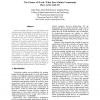Free Online Productivity Tools
i2Speak
i2Symbol
i2OCR
iTex2Img
iWeb2Print
iWeb2Shot
i2Type
iPdf2Split
iPdf2Merge
i2Bopomofo
i2Arabic
i2Style
i2Image
i2PDF
iLatex2Rtf
Sci2ools
HICSS
2007
IEEE
2007
IEEE
The Future of Work: What Does Online Community Have to Do with It?
Amidst constant innovation in information and communication technologies, a new pattern of work is emerging. Hierarchical authority structures are giving way to greater decision-making latitude for individuals and more flexible definitions of job activities [1]. This new style of work presents a challenge to existing organizational forms. In this paper we investigate this concern by contrasting traditional organizational forms against groups that operate as online communities that are characterized by personal motivation and the satisfaction of making one’s own decisions. We analyze the work of online communities by discussing three familiar examples. The analysis is guided by four complementary perspectives: economics, organizational structure, management, and knowledge management. We summarize the high-level results of our analysis as three design implications that might be useful for understanding the phenomena and guide the design of online community infrastructure for work acti...
Biometrics | Greater Decision-making Latitude | HICSS 2007 | Online Communities | Organizational Forms | System Sciences |
Related Content
| Added | 02 Jun 2010 |
| Updated | 02 Jun 2010 |
| Type | Conference |
| Year | 2007 |
| Where | HICSS |
| Authors | Dejin Zhao, Mary Beth Rosson, Sandeep Purao |
Comments (0)

